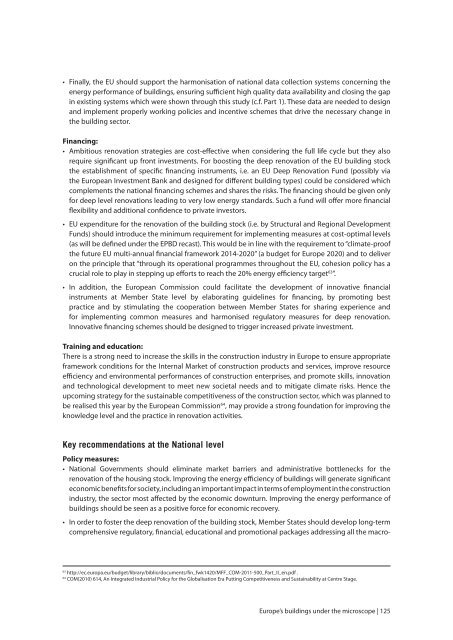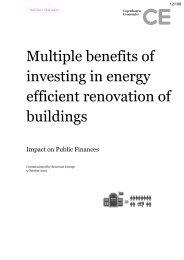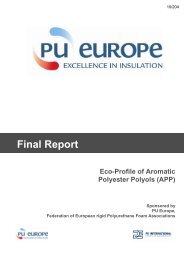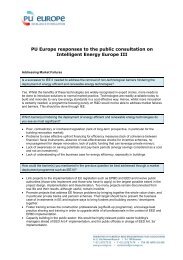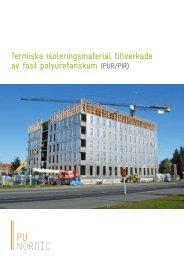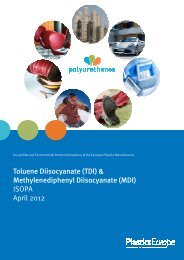BPIE: Europe's buildings under the microscope - PU Europe
BPIE: Europe's buildings under the microscope - PU Europe
BPIE: Europe's buildings under the microscope - PU Europe
Create successful ePaper yourself
Turn your PDF publications into a flip-book with our unique Google optimized e-Paper software.
• Finally, <strong>the</strong> EU should support <strong>the</strong> harmonisation of national data collection systems concerning <strong>the</strong><br />
energy performance of <strong>buildings</strong>, ensuring sufficient high quality data availability and closing <strong>the</strong> gap<br />
in existing systems which were shown through this study (c.f. Part 1). These data are needed to design<br />
and implement properly working policies and incentive schemes that drive <strong>the</strong> necessary change in<br />
<strong>the</strong> building sector.<br />
Financing:<br />
• Ambitious renovation strategies are cost-effective when considering <strong>the</strong> full life cycle but <strong>the</strong>y also<br />
require significant up front investments. For boosting <strong>the</strong> deep renovation of <strong>the</strong> EU building stock<br />
<strong>the</strong> establishment of specific financing instruments, i.e. an EU Deep Renovation Fund (possibly via<br />
<strong>the</strong> <strong>Europe</strong>an Investment Bank and designed for different building types) could be considered which<br />
complements <strong>the</strong> national financing schemes and shares <strong>the</strong> risks. The financing should be given only<br />
for deep level renovations leading to very low energy standards. Such a fund will offer more financial<br />
flexibility and additional confidence to private investors.<br />
• EU expenditure for <strong>the</strong> renovation of <strong>the</strong> building stock (i.e. by Structural and Regional Development<br />
Funds) should introduce <strong>the</strong> minimum requirement for implementing measures at cost-optimal levels<br />
(as will be defined <strong>under</strong> <strong>the</strong> EPBD recast). This would be in line with <strong>the</strong> requirement to “climate-proof<br />
<strong>the</strong> future EU multi-annual financial framework 2014-2020” (a budget for <strong>Europe</strong> 2020) and to deliver<br />
on <strong>the</strong> principle that “through its operational programmes throughout <strong>the</strong> EU, cohesion policy has a<br />
crucial role to play in stepping up efforts to reach <strong>the</strong> 20% energy efficiency target 63 ”.<br />
• In addition, <strong>the</strong> <strong>Europe</strong>an Commission could facilitate <strong>the</strong> development of innovative financial<br />
instruments at Member State level by elaborating guidelines for financing, by promoting best<br />
practice and by stimulating <strong>the</strong> cooperation between Member States for sharing experience and<br />
for implementing common measures and harmonised regulatory measures for deep renovation.<br />
Innovative financing schemes should be designed to trigger increased private investment.<br />
Training and education:<br />
There is a strong need to increase <strong>the</strong> skills in <strong>the</strong> construction industry in <strong>Europe</strong> to ensure appropriate<br />
framework conditions for <strong>the</strong> Internal Market of construction products and services, improve resource<br />
efficiency and environmental performances of construction enterprises, and promote skills, innovation<br />
and technological development to meet new societal needs and to mitigate climate risks. Hence <strong>the</strong><br />
upcoming strategy for <strong>the</strong> sustainable competitiveness of <strong>the</strong> construction sector, which was planned to<br />
be realised this year by <strong>the</strong> <strong>Europe</strong>an Commission 64 , may provide a strong foundation for improving <strong>the</strong><br />
knowledge level and <strong>the</strong> practice in renovation activities.<br />
Key recommendations at <strong>the</strong> National level<br />
Policy measures:<br />
• National Governments should eliminate market barriers and administrative bottlenecks for <strong>the</strong><br />
renovation of <strong>the</strong> housing stock. Improving <strong>the</strong> energy efficiency of <strong>buildings</strong> will generate significant<br />
economic benefits for society, including an important impact in terms of employment in <strong>the</strong> construction<br />
industry, <strong>the</strong> sector most affected by <strong>the</strong> economic downturn. Improving <strong>the</strong> energy performance of<br />
<strong>buildings</strong> should be seen as a positive force for economic recovery.<br />
• In order to foster <strong>the</strong> deep renovation of <strong>the</strong> building stock, Member States should develop long-term<br />
comprehensive regulatory, financial, educational and promotional packages addressing all <strong>the</strong> macro-<br />
63<br />
http://ec.europa.eu/budget/library/biblio/documents/fin_fwk1420/MFF_COM-2011-500_Part_II_en.pdf .<br />
64<br />
COM(2010) 614, An Integrated Industrial Policy for <strong>the</strong> Globalisation Era Putting Competitiveness and Sustainability at Centre Stage.<br />
<strong>Europe</strong>’s <strong>buildings</strong> <strong>under</strong> <strong>the</strong> <strong>microscope</strong> | 125


